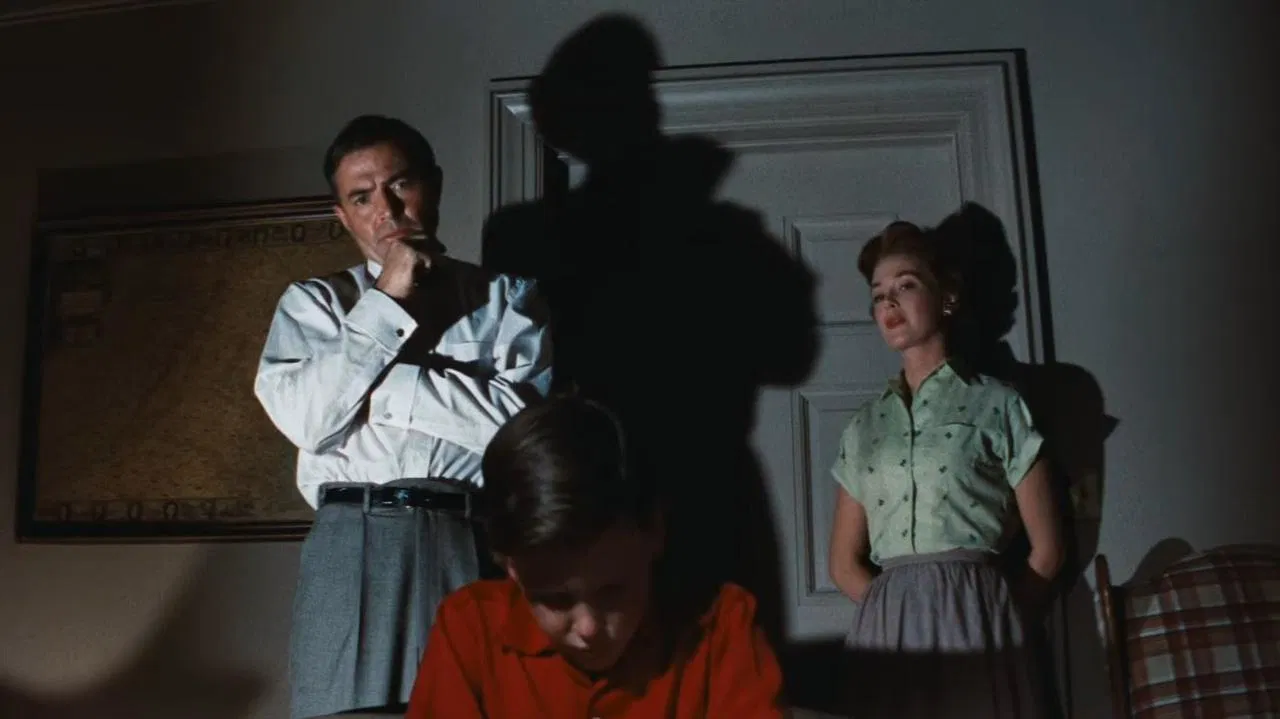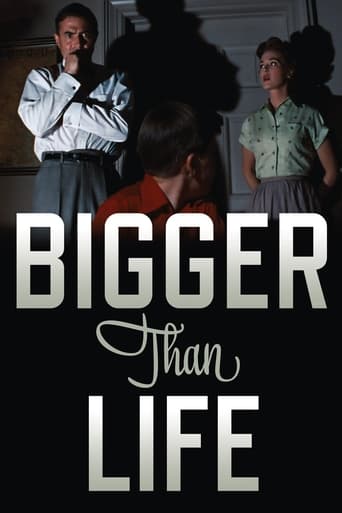Reptileenbu
Did you people see the same film I saw?
Matrixiole
Simple and well acted, it has tension enough to knot the stomach.
Brennan Camacho
Mostly, the movie is committed to the value of a good time.
Sienna-Rose Mclaughlin
The movie really just wants to entertain people.
LeonLouisRicci
This is another of those Lost and Forgotten Films from the 1950's. One that was Criticized, Ignored, Dismissed, and Shelved. Better Forgotten because it just didn't fit. It didn't fit the Archetype Nuclear Family, the Safe Suburbs, the Reliability and Security of the Authority Figure (Father/Teacher), the Church, and Last but not Least, Doctors and Miracle Drugs. This was just Anarchy, Subversive, and probably planted here as some sort of Communist Plot to Undermine the Burgeoning Middle Class. Of course it wasn't but was meant to be. A Scathing Story of the Failures and Flaws of all of those things We hold Dear that were about to show the Cracks in the Mirror of Self Righteousness.The Film is Fascinating when thought of in its Time-Place. It didn't hold much back and Proudly, and without Embarrassment, dared to Poke at the Conventions of the Day. It is Easy to Replace just about anything for the Culprit Cortisone (its abuse causes our Protagonist to Implode), it could be anything, but if Director Nick Ray in Hindsight could do it again, the Poison Pill would have gone Unnamed.This is one of those Antithesis Movies that are a Treat to Rediscover and Look at with Jaded Modern Eyes. What is on View here is a Psychotic Break from the Fragile Safety Net of Cultural Conventions and a Searing Look-See in on the Underneath of the Human Condition. Superbly Shot in a Contrasting Wide Screen Claustrophobic Setting, with some Great Acting and a Director who was most Comfortable causing Chaos among the Comfortable.
evanston_dad
How is it that I'd never heard of this movie before? "Bigger Than Life" is a dream come true for those movie fans (I count myself among them) who love the decade of the 1950s for its total cinematic schizophrenia. I can't think of another decade that created whole omnibuses of films more strongly opposed to one another. It seems that half of the filmmakers of the 50s were churning out earnest Technicolor pap that tried to sell the American public a version of the 50s that simply didn't exist yet which everyone so desperately wanted to believe did, while the other half were making movies about everything that was wrong with the very version of America the other half was clinging to. If you're a fan of subtext in films, and especially interested in seeing how filmmakers could work within the conventions of a genre while turning those conventions against themselves, the 50s are your decade. And for the ultimate master of subtext, look no further than Nicholas Ray.There isn't a Ray film I've seen that isn't dripping in subtext, socio-political, sexual, gender-based, you name it. "Bigger Than Life" stars a towering James Mason as a family man who's turned into a literal monster when he becomes addicted to a drug that helps keep a life-threatening medical problem at bay. The film goes to some jaw-dropping places, especially toward the end, as Mason's character evolves from protector to worst nightmare and the picture-perfect family life depicted in the earlier parts of the film dissolve before our very eyes. However, Ray's point all along is that that picture-perfect family never really existed in the first place, and the drug on which Mason gets hooked brings out the "id" in him and the family dynamic that's been lurking there all along.Ray was the rare director who could make the saturated Technicolor and massive Cinemascope aspect ratios of 1950s filmmaking work to his advantage and serve his artistic purposes, rather than simply be used to photograph pretty gowns and landscapes. In fact, despite its Cinemascope grandeur, "Bigger Than Life" is all about cramped interiors -- offices, bedrooms, one's own feverish mind -- and the skeletons in the closets, real and imagined, that are hiding there.Grade: A
Andy Alburger
Nicholas Ray is one of those classic 50's directors who has a huge cult, even though he only made a handful of excellent films. Experimenting with drugs, a study of the patriarch family and of boring suburban people and mid-life crises, Ray weaved an extremely controversial, yet superb and disenchanted melodrama. Memorable for many brilliant expressions of terrifying drama, lurid colour, a cult director at one of his greatest points, a risqué story which mounts the devastating critique on the materialistic, middle-class society during post-war America, and showing off the brilliant British actor Mr. James Mason, (who also produced such a fascinating time period study) who in a perfectly cast role, gives one of his greatest performances.Before I dig into the pros, which I will likely explain Ray and Mason's perfect touches, and cons, which the film does have, I must first explain the harrowing and interestingly risqué dramatic story, which Cyril Hume and Richard Maibaum controversially put together.Bigger Than Life stars the brooding James Mason (perfectly cast, in a role only he could play that strong) as a small-town teacher beset by worries about money and middle-age. He suffers from a rare disease and is prescribed cortisone, a type of steroids, but he becomes addicted to the sense of well being and bigger than life feeling it brings. The overdose of the drug and the inability to stop taking it, turns him into a neurotic, megalomaniac tyrant to his loving and sensitive wife, (played with warmth by Barbara Rush) scared, innocent son (Christopher Olson) and everyone else around him.A profoundly radical Hollywood movie, the distinguished not only by its distaste for suburban notions of 'normality' but by the change of society and middle-class life during the postwar 50's. The film has an unbelievably raw and dramatic darkly moving score by David Raskin, and the beautifully nightmarish clarity of Bigger Than Life's intense colour scope and realistic dark colourful imagery is always a pleasure to watch. An extremely controversial film, the lighting, sets make the middle- class and small-town 'normal' community and family realistically shown, as well as heighten the melodramatic terrifying drug story and script.Inspired by a New Yorker article by Berton Roueche, the screenplay warns against quick-fix solutions like the cortisone that transforms Mason's ailing teacher into a psychotic tyrant. The dialogue is fine and the film has some brilliantly scripted melodramatic moments and terrifying sequences. Sure, the films beginning is quite slow and the movie may wander off and grow too dramatic at some points, but its still such a provocative and extremely important study on middle-class suburban life and the effect of drugs and overdoses on a perfectly normal man.James Mason gives such a terrifying, dark performance as Ed Avery. Barbara Rush is great, playing off warm and sensitivity and Walter Matthau is also well-casted in a rare dramatic role. Yet the supporting cast, screenplay and technical aspects are all out shined by the brilliant inventive performance from Mr. Mason. Perfectly showing the before and after character and emotion of Ed Avery, Mason is perfect in every sequence, both a sensitive and pitiful hero, as well as a vicious and tyrannical villain, tearing apart his and his family's life by his improper use of a dangerous drug. In every scene, mason gives just the perfect amount of touching emotion, terrifying Hyde-like power and memorable freed from inhibitions raw power, dominating the screen.One of the most intriguing and raw filmmakers ever to be out in Hollywood, Nicholas Ray's follow-up to Rebel Without a Cause may not be as consecutively entertaining, brilliant or versatile to watch, but it's equally as important. In Bigger Than Life, Ray uses the lush and lurid horrifying colour cinematography, to show a realistic nightmare. Perfectly composing the suburban community and notions of 'normality,' Ray gives some terrific angles, terrific set-ups and excellent movement to show the story and develop the raw Mason. Collaborating together, Mason and Ray are perfect together and put together a controversial, yet extremely important and entertaining raw melodrama, which is in fact a masterpiece.
Boba_Fett1138
This is one pretty well directed and acted out movie, that however suffers from a story that feels far from ever being a likely one and the way it presents and unfolds itself just didn't do much for me.You could say that this movie is being too much of a melodrama, that focuses on a worst-case scenario, that however is so unlikely that, to me, the movie falls flat with its drama and emotions, during the movie its most climatic moments. To be frank, the story seemed totally silly, when a normal man starts to go slowly mental, after starting to take a new drug, against a life treating illness he suffers from. It's not only far from likely that a thing like this could ever happen, as gets portrayed in this movie but the whole way all of the characters react to the situation and try to cope with it are just far from likely and come mostly across as very silly. Yes, this is also for some part due to the fact that this movie is an outdated one, though I would imaging that people back in 1956 already had more common sense as well. The wife just comes across as incredibly weak and naive, for instance.So no, this movie really didn't do much for me with any of its emotions but it's still a movie that remains a well made one and also does feature some good moments in it. The entire idea behind this movie remains quite interesting and daring for its time as well but I just feel that the overall execution of it is definitely lacking.I often really love a Nicholas Ray movie, or I end up being very disappointed by it. I'm still willing to give this movie the benefit of the doubt because it still remains an overall well made movie, that just didn't had a very likely script to work with. It also still remains a movie that at times is lacking in its pace and its build up, which also causes some of the movie its drama to fall flat. Perhaps if the movie had been a bit longer, the build up and the eventual pay off of the movie would had worked out a lot better, though it would had probably provided the movie as well with some more pacing problems.Also the actors did really their best. James Mason was a great leading man for this movie and Walter Matthau also shows up, in one of his earlier movie roles. Still funny to see how James Mason always keeps up his thick English accent in American movies, like he simply didn't care.Nothing about this movie made me hate it but it's also too flawed to love it really.7/10http://bobafett1138.blogspot.com/

